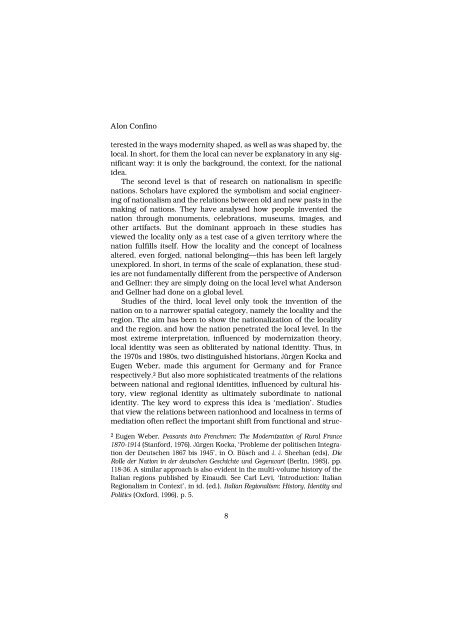Download - German Historical Institute London
Download - German Historical Institute London
Download - German Historical Institute London
Create successful ePaper yourself
Turn your PDF publications into a flip-book with our unique Google optimized e-Paper software.
Alon Confino<br />
terested in the ways modernity shaped, as well as was shaped by, the<br />
local. In short, for them the local can never be explanatory in any significant<br />
way: it is only the background, the context, for the national<br />
idea.<br />
The second level is that of research on nationalism in specific<br />
nations. Scholars have explored the symbolism and social engineering<br />
of nationalism and the relations between old and new pasts in the<br />
making of nations. They have analysed how people invented the<br />
nation through monuments, celebrations, museums, images, and<br />
other artifacts. But the dominant approach in these studies has<br />
viewed the locality only as a test case of a given territory where the<br />
nation fulfills itself. How the locality and the concept of localness<br />
altered, even forged, national belonging—this has been left largely<br />
unexplored. In short, in terms of the scale of explanation, these studies<br />
are not fundamentally different from the perspective of Anderson<br />
and Gellner: they are simply doing on the local level what Anderson<br />
and Gellner had done on a global level.<br />
Studies of the third, local level only took the invention of the<br />
nation on to a narrower spatial category, namely the locality and the<br />
region. The aim has been to show the nationalization of the locality<br />
and the region, and how the nation penetrated the local level. In the<br />
most extreme interpretation, influenced by modernization theory,<br />
local identity was seen as obliterated by national identity. Thus, in<br />
the 1970s and 1980s, two distinguished historians, Jürgen Kocka and<br />
Eugen Weber, made this argument for <strong>German</strong>y and for France<br />
respectively. 2 But also more sophisticated treatments of the relations<br />
between national and regional identities, influenced by cultural history,<br />
view regional identity as ultimately subordinate to national<br />
identity. The key word to express this idea is ‘mediation’. Studies<br />
that view the relations between nationhood and localness in terms of<br />
mediation often reflect the important shift from functional and struc-<br />
2 Eugen Weber, Peasants into Frenchmen: The Modernization of Rural France<br />
1870-1914 (Stanford, 1976). Jürgen Kocka, ‘Probleme der politischen Integration<br />
der Deutschen 1867 bis 1945’, in O. Büsch and J. J. Sheehan (eds), Die<br />
Rolle der Nation in der deutschen Geschichte und Gegenwart (Berlin, 1985), pp.<br />
118-36. A similar approach is also evident in the multi-volume history of the<br />
Italian regions published by Einaudi. See Carl Levi, ‘Introduction: Italian<br />
Regionalism in Context’, in id. (ed.), Italian Regionalism: History, Identity and<br />
Politics (Oxford, 1996), p. 5.<br />
8













